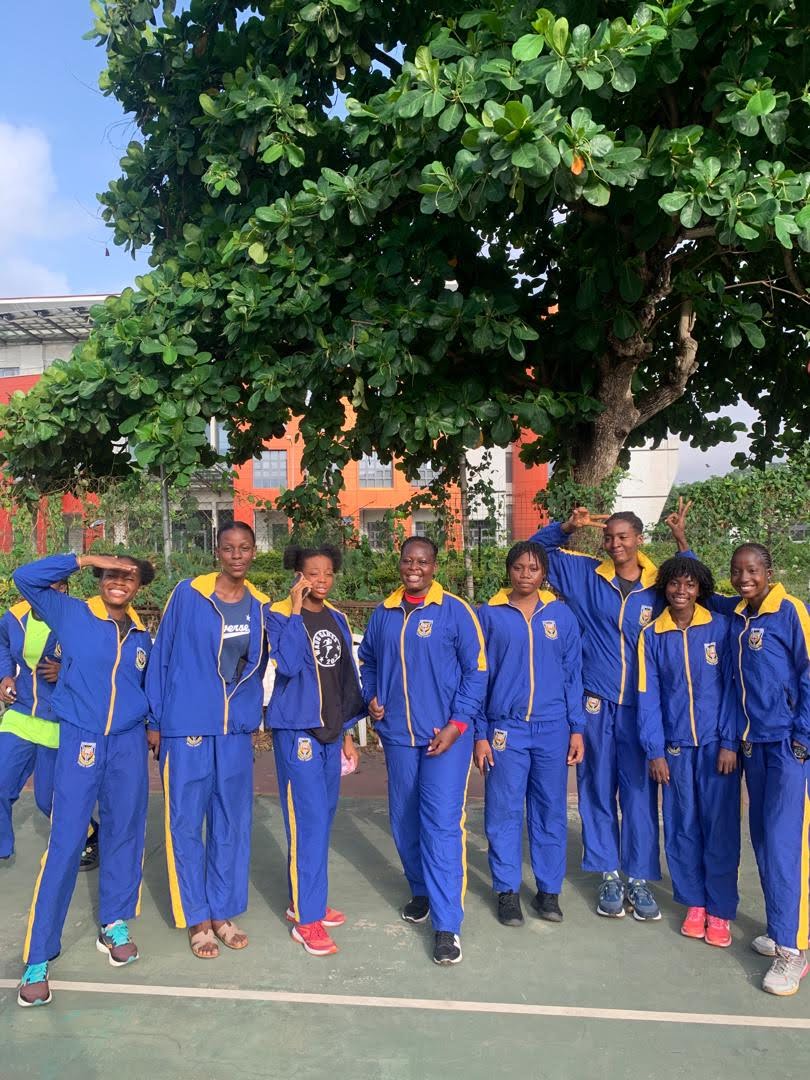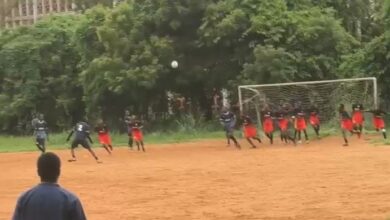Some Not-So-Popular Sports Played In The University of Ibadan

Have you ever been handed a menu in a restaurant and after skimming through the card, you can’t find your favourite delicacy? Okay, maybe the possibility of that occurrence is 1 in 10,000. Have you filled a form where there’s a field asking you to tick your favourite sport and, somehow, your favourite wasn’t listed? Well, this is the reality of that average university student whose interest in sports doesn’t conform to the mainstream choices like football, basketball, volleyball, or even tennis. Students like this feel left out on university campuses that don’t make provisions for a variety of sports, most especially because sports are largely seen as an avenue to exercise, cool one’s head from overwhelming academic schedules, etc.
While on some campuses, there aren’t really provisions for other sports aside the mainstream ones, in some others, there is not enough awareness about the existence of these not-so-popular sports. A good example is the University of Ibadan where a tour around all sports arena on campus will make a student think there aren’t so many choices for the community. This is the second semester – particularly the busier one where there’d be a lot of competitions within and beyond the faculties, also outside the walls of the University. In this article, we’ll be introducing some unpopular sports played in the university of Ibadan, also adding a channel to communicate your interest, should it be piqued.
Badminton
Originating sometime in the 19th century, badminton has evolved into a fast-paced and dynamic racquet sport. The court, measuring 13.4 meters by 6.1 meters for doubles and 5.18 meters for singles, hosts the game. It is divided into two halves by a net that stands at 1.55 meters at the edges and is slightly lower at the centre. The projectile ball — a shuttlecock — is used; it is traditionally made of feathers and a cork base, or it can be made of synthetic materials.
Some students in the university have fallen in love with this sport. Speaking to one of the school team players, he mentioned that he has been playing the sport since 2014, and immediately he gained admission into the university, he sought out the badminton team and joined as quickly as possible.
Currently, the UI badminton team consists of 7 players, although there are more who are still learning the trade. Asking the same source about training times, courts, and coaching, he replied that the team uses Bello Dome — albeit not officially. He went further to explain that they do not have a designated court to train, so they have to make do with Bello Dome, where they are sometimes asked to leave if the Dome has been paid for, for some other event. As for coaching, he mentioned that the team does not have an official coach but a Mr. Yemi, an Oyo State player, comes from time to time to train them. As a result of the uncertainty surrounding the use of Bello Dome and the different timetables of the players in this new semester, he couldn’t give specific training times, but he said that would be sorted out after the players have meetings this new semester.
The school’s lack of interest in the sport has cost the players and even the school itself. This was seen earlier this year at the annual bilateral games, where the badminton team lost all of its 5 games [mixed doubles, doubles (male and female), and singles (male and female)] against their Ghanaian opponents. The same source called upon the school to try to support the sport by providing them with tapes, shuttlecocks, racquets, and a definite court where they can train. All of these will boost team output and increase awareness of the sport among the students. He also mentioned that this would be the time to do so, so as to forestall a repeat of the experience of the Bilateral Games at next year’s Nigeria’s University Games Association, NUGA, Games, which is billed to hold in Jos from April 26th to May 10th, 2025.
If interested in playing badminton in UI, you can contact Habdol at +234 810 977 9530.
Judo
KA POWW! This sound comes to many minds when they hear about martial arts: Judo, a martial art rooted in the principles of discipline, mutual respect, and continuous self-improvement. Originating in Japan, this form of physical and mental training is about more than just self-defense — although this part is very important, it emphasizes balance and strategic thinking and can serve as a community within the university.
In the University of Ibadan, judo is one of the better-performing sports. This is not far-fetched, as members of the club train every day in the university’s gym from 3-5 PM. Speaking to a source, he said partaking in many intra and interschool competitions helps individual members of the judo team become better, and therefore the team as a whole is better. Some of these competitions are Inter-Hall, Inter-Faculty, a celebration of World Judo Day at Òkè Ìla, Osun State, and Bilateral Games with Ghana, where the team won 5 gold medals out of a possible 7 fights.
As for support from the school, the school employs a coach, Sensei Stephen Olusola Aloba, and sponsors the team in some competitions. Due to the contact-dependent nature of the sport, injuries are expected; to this effect, a medical officer’s facility is just a few meters away from the gym. This is where those who get injured go for care; all the cost is covered under the registration with the University Health Service and registering to join the judo team.
If you are thinking about joining UI Judo, the process is easy. Just walk down to the gym in the afternoon and make inquiries with anyone in charge, or you can directly text the judo team captain, Gbemileke Onifade – +2349069065188.
Hockey
Without conscious effort and certain structures in place, most things die a natural death. This was what happened to hockey at the University of Ibadan after the previous coach traveled. However, hockey enthusiasts in the then 300-level class (as at the 2022/2023 session) of Human Kinetics banded together to revive the sport in the university. According to one of them, “We were offering a 300-level course, Skills Development and Techniques in Hockey, and the lecturer in charge admonished us to do something about the hockey team, so we just took it up.”
Field hockey is played by two teams consisting of 11 players each, including 1 goalkeeper. The players all make use of a hockey stick to try to put a small, plastic, and hard ball into the back of the other’s net. The ideal field dimensions are 91.4 meters long and 55 meters wide. Since they came together to re-form a now green hockey team, the team now has a new coach, Dr. Adisa; he is assisted by Mr. Elisha, who was once a captain of the hockey team. Training sessions are on Wednesdays and Fridays by 4 PM and on Saturdays by 7 AM.
As for outings, the team represented the university at the Bilateral Games held earlier this year in Legion, Ghana. Although they lost to their Ghanaian counterparts, one of the players was very optimistic about the future of hockey at the university, as it could only go up from there. He mentioned that they would shift their focus to the National University Games Association NUGA Games, which should be held in April 2025. For interested fans and players, here is a link to a central WhatsApp group chat for hockey activities in the university.
Handball
Mikkel Hansen, Nikola Karabatic, Cristina Neagu, Ivano Balic. For most, these names are just what they are – names. But for those that know, these names are meant to be revered and put on the same pedestal as the likes of LeBron James, Serena Williams, and Cristiano Ronaldo. Why? These names are some of the greatest to have ever played handball. Although relatively unknown, our campus has a small, budding community of handball enthusiasts. But before we delve into this community, let’s familiarize ourselves with the basics of the sport.
Handball is an exciting, fast-paced Olympic team sport that incorporates aspects of basketball, football, and water polo. The game is played indoors on a rectangular court and consists of two teams of seven players each, including a goalkeeper. The goal is to score by throwing a little hard ball into the opponent’s net. Players can pass, dribble, and shoot the ball with only their hands, resulting in a high-energy game that demands agility, speed, and precision. Defenders may use their bodies to make contact with attackers, preventing them from taking a clear shot on goal. To score a goal, attackers attempt to burst past the defence or shoot over them. Substitutions may be made at any time. Each goal counts as one point, and games frequently end with teams scoring more than 20 points. Goalkeepers stand in a 6m goal area that court players are not permitted to enter; however, they may leap into this area when shooting as long as they shoot before landing. When not in possession of the ball, goalkeepers can leave their goal area to play on the court.
The current handball team in UI trains every Monday, Wednesday, and Friday from 4-6 PM at the handball court opposite the Faculty of Economics, beside the Sports Council building. It comprises about ten boys, eight girls, and the coach. The coach, Coach Olusola, is a postgraduate student who doubles as a player in stiffer competitions. In these competitions, the University employs a contract coach for the duration of the competition. An example of such competition was the NUGA 2022.
In an interview with the coach, he shared that he took over the reins of affairs two years ago. In that time, handball in UI has undergone tremendous development: the formation of a female handball team, the pioneering of an annual Southwest Handball competition among universities, and the growth of the team. As for competitions, he oversaw the female UI Handlers in this year’s Bilateral Games. He was also in charge of the team that participated in the 2023 and 2024 Southwest Handball competitions that featured teams from the Obafemi Awolowo University, Ladoke Akintola University of Technology and a host of others.
When asked about the recruitment process, he conceded that it is a bit of a challenge as handball isn’t a traditionally mainstream sport. He said that the team recruited primarily in three ways; some members come from the department of Human Kinetics and Health Education because it is a mandatory course for the 200-level class (so students who enjoy it keep at it), he also scouts players personally from other sports, other members come in response to fliers released and by word of mouth from people already on the team. Speaking to Temi, one of the players, she said she joined the female team last year just before the annual Bilateral Games on the recommendation of her basketball coach.
The coach said it was a shame that everyone was running to mainstream sports to spend all their four years or more with nothing to show. Probably because they didn’t know the opportunities that handball had to offer, he went further to state that about four former UI Handlers are now part of the Oyo State Handball team, which was made easier because he was the secretary for the association of handball coaches in Oyo State. If interested, you can always go to the handball court in the evening on any of the team’s training days or contact Coach Olusola – 08187684723.
If this piece has served its purpose and made you the tiniest bit curious about some sports that you may not know exist in UI, then make an extra effort to be a part by reaching out to any contacts attached to the sport(s) of interest.
Gerald Olokungbemi.


